Units 5-6基础知识讲义及练习(含答案)2023-2024学年牛津译林版八年级英语下册
文档属性
| 名称 | Units 5-6基础知识讲义及练习(含答案)2023-2024学年牛津译林版八年级英语下册 |
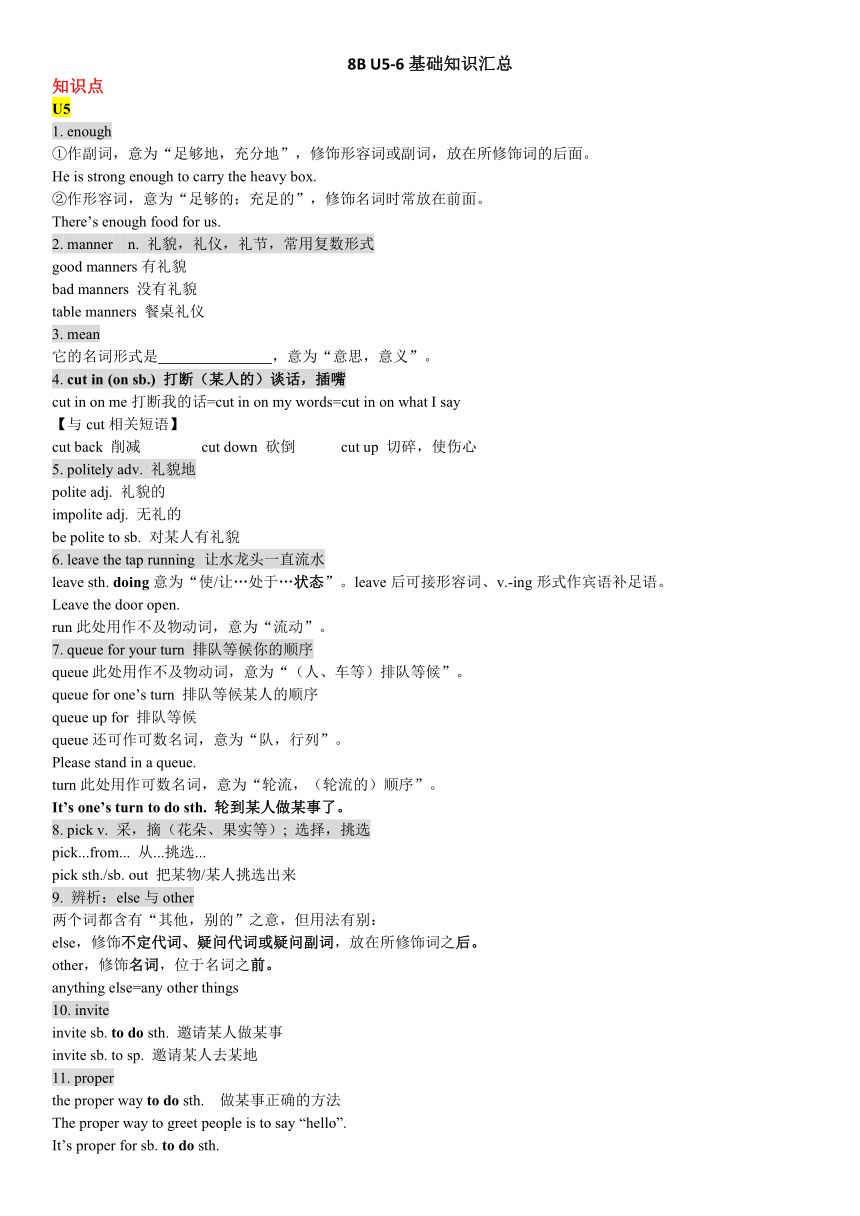
|
|
| 格式 | docx | ||
| 文件大小 | 218.4KB | ||
| 资源类型 | 教案 | ||
| 版本资源 | 牛津译林版 | ||
| 科目 | 英语 | ||
| 更新时间 | 2024-05-13 09:39:30 | ||
图片预览

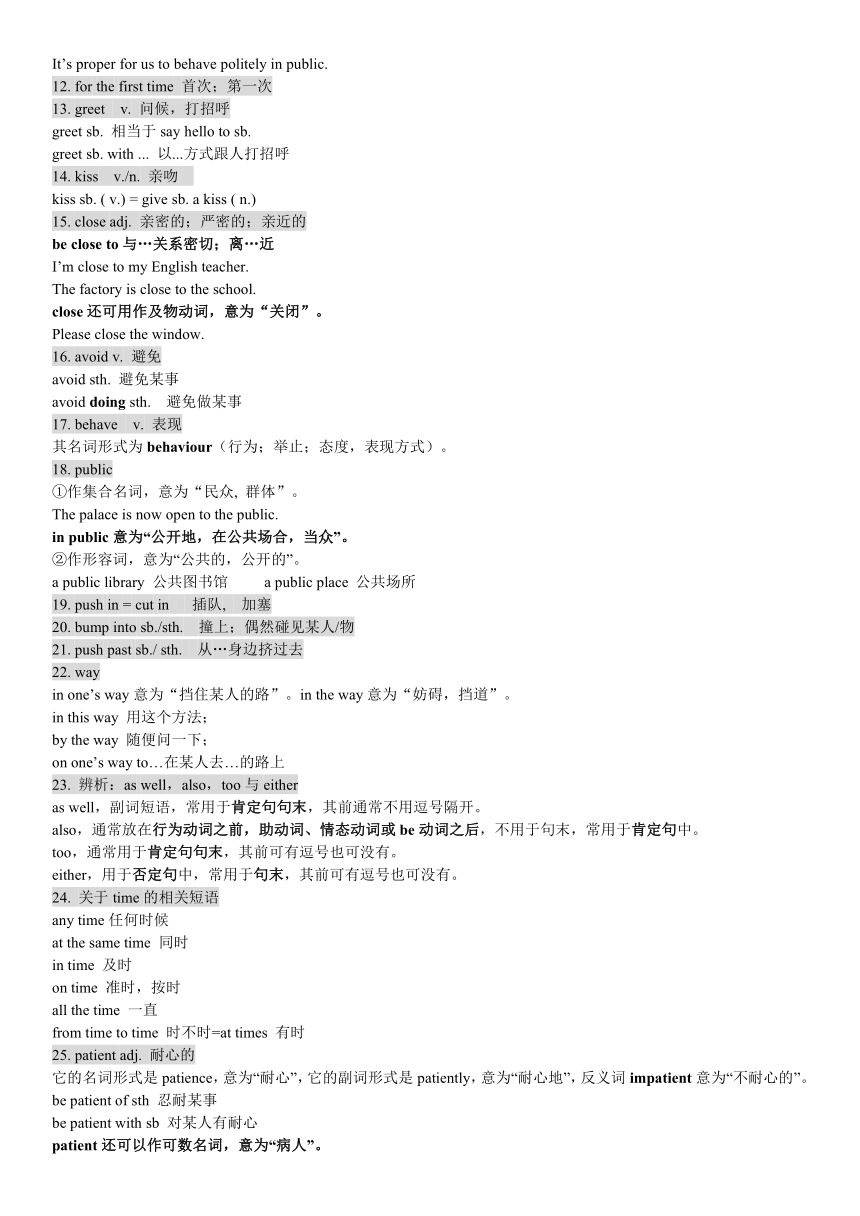
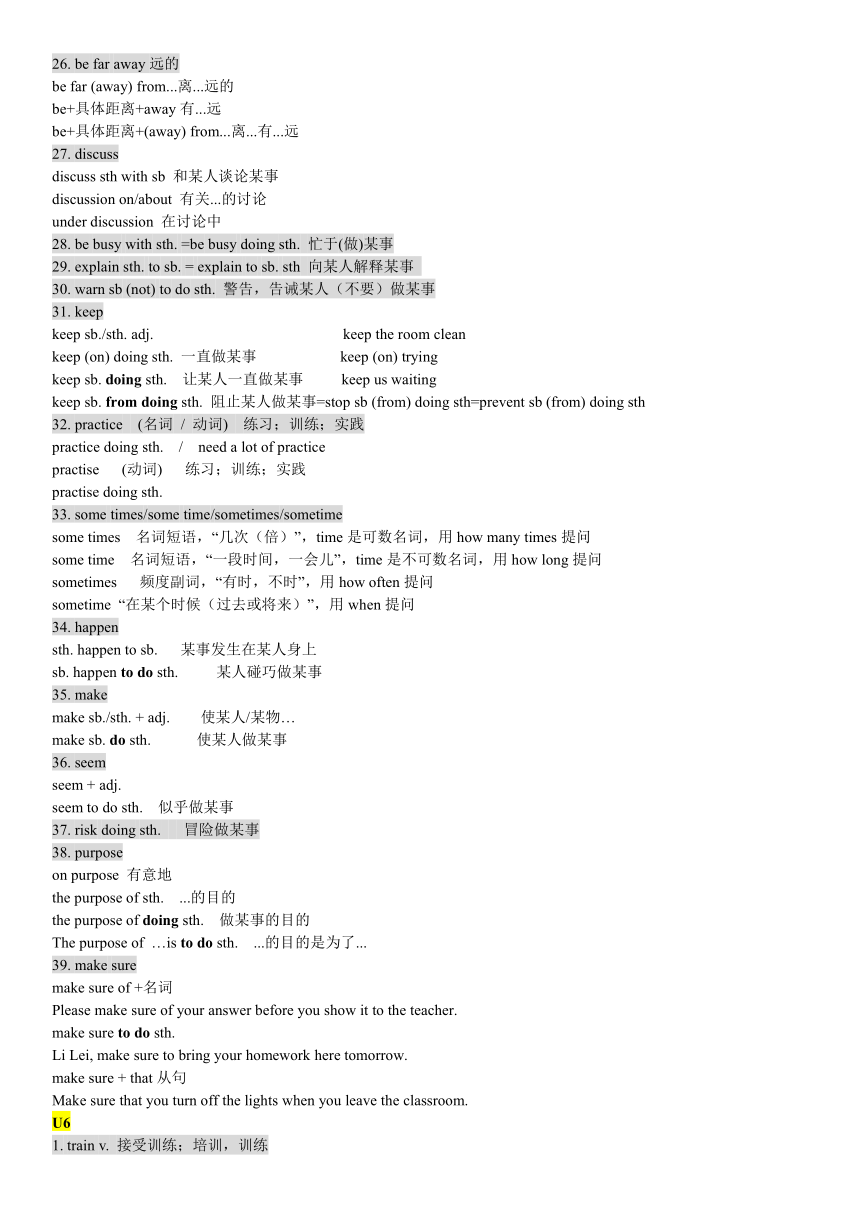
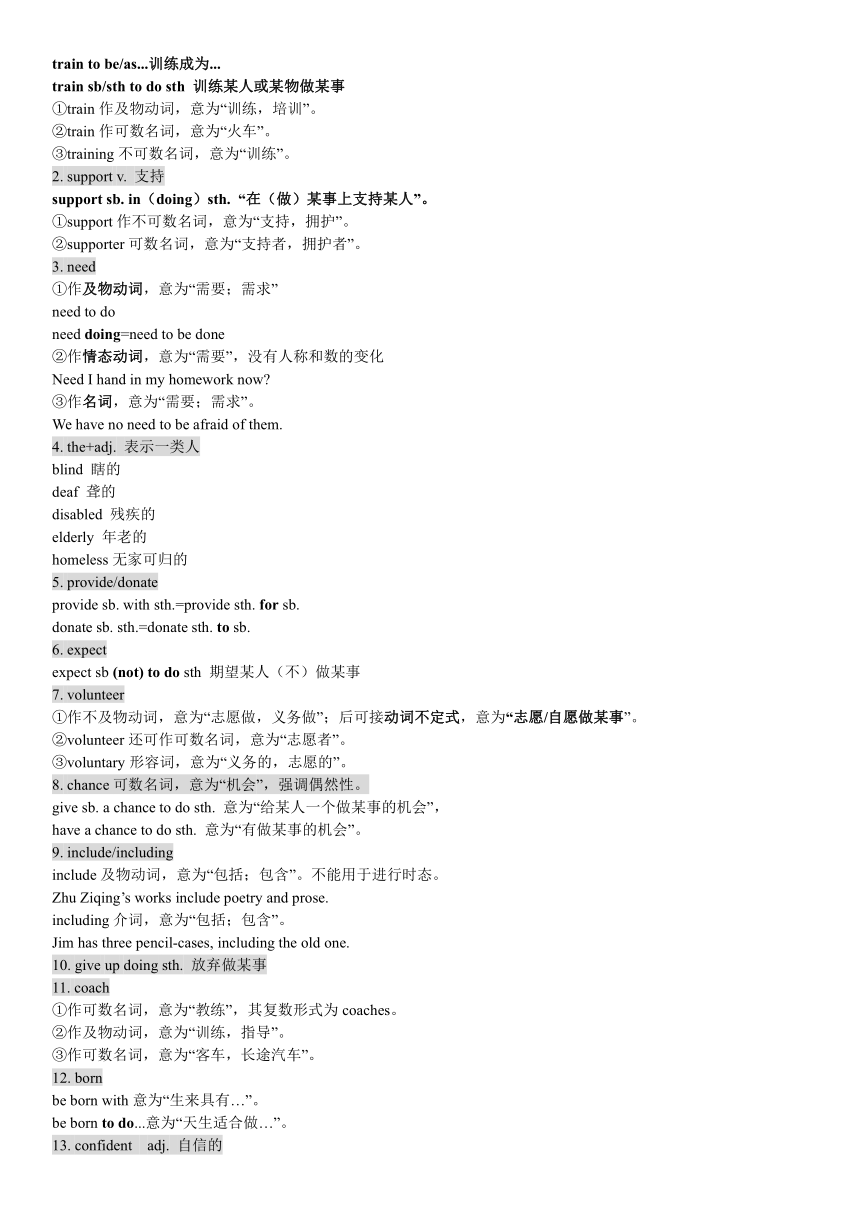
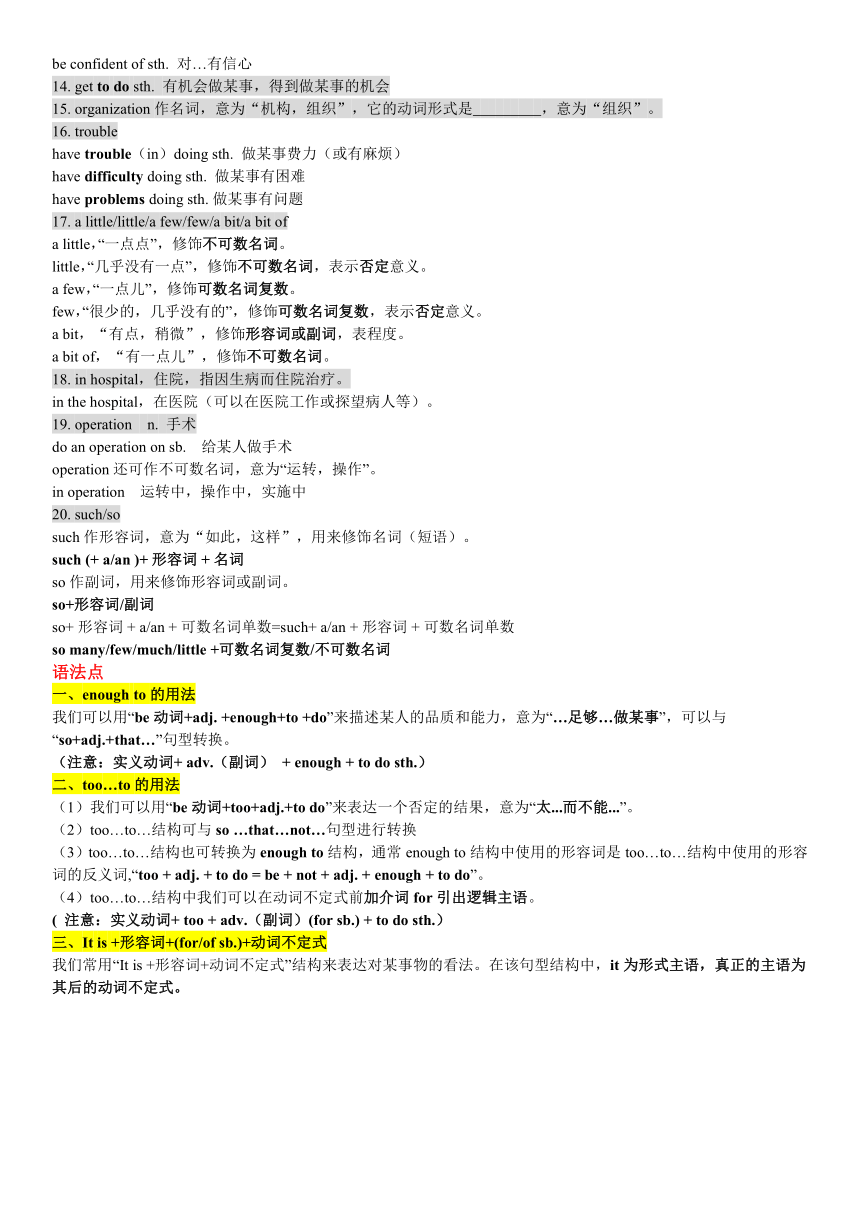
文档简介
8B U5-6基础知识汇总
知识点
U5
1. enough
①作副词,意为“足够地,充分地”,修饰形容词或副词,放在所修饰词的后面。
He is strong enough to carry the heavy box.
②作形容词,意为“足够的;充足的”,修饰名词时常放在前面。
There’s enough food for us.
2. manner n. 礼貌,礼仪,礼节,常用复数形式
good manners有礼貌
bad manners 没有礼貌
table manners 餐桌礼仪
3. mean
它的名词形式是 ,意为“意思,意义”。
4. cut in (on sb.) 打断(某人的)谈话,插嘴
cut in on me打断我的话=cut in on my words=cut in on what I say
【与cut相关短语】
cut back 削减 cut down 砍倒 cut up 切碎,使伤心
5. politely adv. 礼貌地
polite adj. 礼貌的
impolite adj. 无礼的
be polite to sb. 对某人有礼貌
6. leave the tap running 让水龙头一直流水
leave sth. doing意为“使/让…处于…状态”。leave后可接形容词、v.-ing形式作宾语补足语。
Leave the door open.
run此处用作不及物动词,意为“流动”。
7. queue for your turn 排队等候你的顺序
queue此处用作不及物动词,意为“(人、车等)排队等候”。
queue for one’s turn 排队等候某人的顺序
queue up for 排队等候
queue还可作可数名词,意为“队,行列”。
Please stand in a queue.
turn此处用作可数名词,意为“轮流,(轮流的)顺序”。
It’s one’s turn to do sth. 轮到某人做某事了。
8. pick v. 采,摘(花朵、果实等); 选择,挑选
pick...from... 从...挑选...
pick sth./sb. out 把某物/某人挑选出来
9. 辨析:else与other
两个词都含有“其他,别的”之意,但用法有别:
else,修饰不定代词、疑问代词或疑问副词,放在所修饰词之后。
other,修饰名词,位于名词之前。
anything else=any other things
10. invite
invite sb. to do sth. 邀请某人做某事
invite sb. to sp. 邀请某人去某地
11. proper
the proper way to do sth. 做某事正确的方法
The proper way to greet people is to say “hello”.
It’s proper for sb. to do sth.
It’s proper for us to behave politely in public.
12. for the first time 首次;第一次
13. greet v. 问候,打招呼
greet sb. 相当于say hello to sb.
greet sb. with ... 以...方式跟人打招呼
14. kiss v./n. 亲吻
kiss sb. ( v.) = give sb. a kiss ( n.)
15. close adj. 亲密的;严密的;亲近的
be close to与…关系密切;离…近
I’m close to my English teacher.
The factory is close to the school.
close还可用作及物动词,意为“关闭”。
Please close the window.
16. avoid v. 避免
avoid sth. 避免某事
avoid doing sth. 避免做某事
17. behave v. 表现
其名词形式为behaviour(行为;举止;态度,表现方式)。
18. public
①作集合名词,意为“民众, 群体”。
The palace is now open to the public.
in public意为“公开地,在公共场合,当众”。
②作形容词,意为“公共的,公开的”。
a public library 公共图书馆 a public place 公共场所
19. push in = cut in 插队, 加塞
20. bump into sb./sth. 撞上;偶然碰见某人/物
21. push past sb./ sth. 从…身边挤过去
22. way
in one’s way意为“挡住某人的路”。in the way意为“妨碍,挡道”。
in this way 用这个方法;
by the way 随便问一下;
on one’s way to…在某人去…的路上
23. 辨析:as well,also,too与either
as well,副词短语,常用于肯定句句末,其前通常不用逗号隔开。
also,通常放在行为动词之前,助动词、情态动词或be动词之后,不用于句末,常用于肯定句中。
too,通常用于肯定句句末,其前可有逗号也可没有。
either,用于否定句中,常用于句末,其前可有逗号也可没有。
24. 关于time的相关短语
any time任何时候
at the same time 同时
in time 及时
on time 准时,按时
all the time 一直
from time to time 时不时=at times 有时
25. patient adj. 耐心的
它的名词形式是patience,意为“耐心”,它的副词形式是patiently,意为“耐心地”,反义词impatient意为“不耐心的”。
be patient of sth 忍耐某事
be patient with sb 对某人有耐心
patient还可以作可数名词,意为“病人”。
26. be far away远的
be far (away) from...离...远的
be+具体距离+away有...远
be+具体距离+(away) from...离...有...远
27. discuss
discuss sth with sb 和某人谈论某事
discussion on/about 有关...的讨论
under discussion 在讨论中
28. be busy with sth. =be busy doing sth. 忙于(做)某事
29. explain sth. to sb. = explain to sb. sth 向某人解释某事
30. warn sb (not) to do sth. 警告,告诫某人(不要)做某事
31. keep
keep sb./sth. adj. keep the room clean
keep (on) doing sth. 一直做某事 keep (on) trying
keep sb. doing sth. 让某人一直做某事 keep us waiting
keep sb. from doing sth. 阻止某人做某事=stop sb (from) doing sth=prevent sb (from) doing sth
32. practice (名词 / 动词) 练习;训练;实践
practice doing sth. / need a lot of practice
practise (动词) 练习;训练;实践
practise doing sth.
33. some times/some time/sometimes/sometime
some times 名词短语,“几次(倍)”,time是可数名词,用how many times提问
some time 名词短语,“一段时间,一会儿”,time是不可数名词,用how long提问
sometimes 频度副词,“有时,不时”,用how often提问
sometime “在某个时候(过去或将来)”,用when提问
34. happen
sth. happen to sb. 某事发生在某人身上
sb. happen to do sth. 某人碰巧做某事
35. make
make sb./sth. + adj. 使某人/某物…
make sb. do sth. 使某人做某事
36. seem
seem + adj.
seem to do sth. 似乎做某事
37. risk doing sth. 冒险做某事
38. purpose
on purpose 有意地
the purpose of sth. ...的目的
the purpose of doing sth. 做某事的目的
The purpose of …is to do sth. ...的目的是为了...
39. make sure
make sure of +名词
Please make sure of your answer before you show it to the teacher.
make sure to do sth.
Li Lei, make sure to bring your homework here tomorrow.
make sure + that从句
Make sure that you turn off the lights when you leave the classroom.
U6
1. train v. 接受训练;培训,训练
train to be/as...训练成为...
train sb/sth to do sth 训练某人或某物做某事
①train作及物动词,意为“训练,培训”。
②train作可数名词,意为“火车”。
③training不可数名词,意为“训练”。
2. support v. 支持
support sb. in(doing)sth. “在(做)某事上支持某人”。
①support 作不可数名词,意为“支持,拥护”。
②supporter可数名词,意为“支持者,拥护者”。
3. need
①作及物动词,意为“需要;需求”
need to do
need doing=need to be done
②作情态动词,意为“需要”,没有人称和数的变化
Need I hand in my homework now
③作名词,意为“需要;需求”。
We have no need to be afraid of them.
4. the+adj. 表示一类人
blind 瞎的
deaf 聋的
disabled 残疾的
elderly 年老的
homeless无家可归的
5. provide/donate
provide sb. with sth.=provide sth. for sb.
donate sb. sth.=donate sth. to sb.
6. expect
expect sb (not) to do sth 期望某人(不)做某事
7. volunteer
①作不及物动词,意为“志愿做,义务做”;后可接动词不定式,意为“志愿/自愿做某事”。
②volunteer还可作可数名词,意为“志愿者”。
③voluntary形容词,意为“义务的,志愿的”。
8. chance可数名词,意为“机会”,强调偶然性。
give sb. a chance to do sth. 意为“给某人一个做某事的机会”,
have a chance to do sth. 意为“有做某事的机会”。
9. include/including
include及物动词,意为“包括;包含”。不能用于进行时态。
Zhu Ziqing’s works include poetry and prose.
including介词,意为“包括;包含”。
Jim has three pencil-cases, including the old one.
10. give up doing sth. 放弃做某事
11. coach
①作可数名词,意为“教练”,其复数形式为coaches。
②作及物动词,意为“训练,指导”。
③作可数名词,意为“客车,长途汽车”。
12. born
be born with意为“生来具有…”。
be born to do...意为“天生适合做…”。
13. confident adj. 自信的
be confident of sth. 对…有信心
14. get to do sth. 有机会做某事,得到做某事的机会
15. organization作名词,意为“机构,组织”,它的动词形式是 ,意为“组织”。
16. trouble
have trouble(in)doing sth. 做某事费力(或有麻烦)
have difficulty doing sth. 做某事有困难
have problems doing sth. 做某事有问题
17. a little/little/a few/few/a bit/a bit of
a little,“一点点”,修饰不可数名词。
little,“几乎没有一点”,修饰不可数名词,表示否定意义。
a few,“一点儿”,修饰可数名词复数。
few,“很少的,几乎没有的”,修饰可数名词复数,表示否定意义。
a bit,“有点,稍微”,修饰形容词或副词,表程度。
a bit of,“有一点儿”,修饰不可数名词。
18. in hospital,住院,指因生病而住院治疗。
in the hospital,在医院(可以在医院工作或探望病人等)。
19. operation n. 手术
do an operation on sb. 给某人做手术
operation还可作不可数名词,意为“运转,操作”。
in operation 运转中,操作中,实施中
20. such/so
such作形容词,意为“如此,这样”,用来修饰名词(短语)。
such (+ a/an )+ 形容词 + 名词
so作副词,用来修饰形容词或副词。
so+形容词/副词
so+ 形容词 + a/an + 可数名词单数=such+ a/an + 形容词 + 可数名词单数
so many/few/much/little +可数名词复数/不可数名词
语法点
一、enough to的用法
我们可以用“be动词+adj. +enough+to +do”来描述某人的品质和能力,意为“…足够…做某事”,可以与“so+adj.+that…”句型转换。
(注意:实义动词+ adv.(副词) + enough + to do sth.)
二、too…to的用法
(1)我们可以用“be动词+too+adj.+to do”来表达一个否定的结果,意为“太...而不能...”。
(2)too…to…结构可与so …that…not…句型进行转换
(3)too…to…结构也可转换为enough to结构,通常enough to结构中使用的形容词是too…to…结构中使用的形容词的反义词,“too + adj. + to do = be + not + adj. + enough + to do”。
(4)too…to…结构中我们可以在动词不定式前加介词for引出逻辑主语。
( 注意:实义动词+ too + adv.(副词)(for sb.) + to do sth.)
三、It is +形容词+(for/of sb.)+动词不定式
我们常用“It is +形容词+动词不定式”结构来表达对某事物的看法。在该句型结构中,it为形式主语,真正的主语为其后的动词不定式。
复习卷
一、单项填空
1. Mr. Jiang, as _________ elderly man, took part in the Special Games for _________ elderly, and finish _________ second in the race.
A. a: the; the B. an; the;/ C. an;an;the D. the; an; /
2. _________ is really hard _________ each of us to climb such a high mountain.
A. This: to B. It; of C. This; for D. It; for.
3. - Would you like to go _________ for a vacation - Yes, I'd love to.
A. somewhere relaxing B. anywhere relaxing
C. somewhere relaxed D. everywhere relaxing
4. Dad always tells me not to study only for tests. If that’s all I’m doing, he says, I will soon lose _________ in learning.
A.help B.abilities C.interest D.ways
5. - Do you know the first shop for left - handed people in Dalian
- Sure, the shop offers products made _________ for left - handers.
A. specially B. fairly C. strongly D. finally
6. - The volunteers really provided the athletes with support.
- Exactly. _________ they helped make the event!
A. What a great success B. What great success
C. How a great success D. How great success
7. The people who are more confident have more _________ to make themselves successful.
A. excuses B. chances C. education D. price
8. Jim sat _________ to his mother with his eyes half _________ .
A. closed, opened B. close, open
C. closely, opening D. close, opened
9. Mr. White says the doctors will _________ on my mother, and it will _________ about 200, 000 yuan.
A. have a check; take B. provide an operation; spend
C. do an operation; cost D. take a good care;pay
10. - Doctor, I think I'm _________ to leave hospital.
- Not really. You need to stay here for _________ days.
A. well enough; another two B. good enough; two more
C. well enough; two other D. good enough; other two
11. He accepted the _________ with pleasure. He thought it as an honor to attend such a great party.
A. instruction B. invitation C. introduction D. invention
12. I had as much fun sailing the seas as I now do _________ with students.
A. working B. work C. to work D. worked
13. To them, the most important thing is _________ make much money _________ get together.
A. not to; but B. not; but C. not; but to D. not to; but to
14. - What else should we pay attention to _________ building the bridge
- The change of the weather. I think.
A. finish B. finished C. to finish D. finishing
15. I feel it hard to keep up with my classmate in English. But whenever I want to _________ , my English teacher always encourages me to work harder.
A. give out B. give up C. give off D. give back
答案:BDACA ABBCA BADCB
二、词汇检测根据下列句子及所给汉语注释或通过上下文,在横线上写出空缺处各单词的正确形式。每空只写一词。
16. I heard Rosie spend two hours a day t _________ for the sports meeting.training
17. Many students don’t know how to a _________ a balance (平衡) between study and hobbies.achieve
18. The 2 - year - old baby is the only s_________ in the earthquake.survivor
19. It's cruel of the man to be b__________ suffering of others.blind
20. The talks are e _________to continue until tomorrow since they haven't come to a conclusion.expected
21. The man have children to raise, money to be earned and a family to s _________ .support
22. I can't tell the difference between the twins because they are too s _________ .similar
23. He was badly hurt and will be sent to the hospital to have an o _________ right away.operation
24. Aunt Mary was so kind that she v _________ to work as a nurse in ORBIS.volunteered
25. His d______________ prevents him from living alone.disabilities
26. These - sports - equipment - must - be - those _________ (运动员).athletes’
27. Our main _________ (任务)have been finished already.tasks
28. It is our duty to help the children with _________ (智力上的) problems.intellectual
29. Lang Ping is one of the most famous _________ (教练) around the world.coaches
31. How _________ (有意义的)it is for us to win the competition for the first time!meaningful
32. Mr Lee is trying to put up an _________ (组织) to help the blind people.organization
33. The government is trying to give _________ (年老的) people a happy old age.elderly
34. Visitors from different ___________(背景)are waiting to enter the garden.backgrounds
35. His goal is to win more _________ (金牌)than before in the coming Olympic Games.golds
36. - I'm not sure whether I can have a presentation successfully.
- Be _________ . You have prepared so much.confident
37. - How did he perform in the match
- Excellent! He beat all the competitors and won the first _________ .prize
- The flood washed away many villages and made thousands of people _________
- I feel sorry to hear that. Let's do something to help them.homeless
39. - Can I refuse to take part in the game since I think I may lose it
- Take the _________ or you will feel regretful(遗憾的).chance
40. - Can you give us an _________ This is the first time we have met.introduction
- Of course.
三、句子翻译将下列句子译成英语,并将所译句子写在标有题号的横线上。
41.如果有必要的话,我们愿意在下周就开始这个项目。
If (it is)necessary ,we are willing to start the project next week.
42.成年人总是以更加明智的方式处理问题。
Adults always deal with problems in wiser ways.
43.她如此善良,时不时向山区的孩子捐赠一些书籍。
It is so kind/nice of her to donate some books to the children in the mountain areas from time to time .
44.过去人们养家糊口是很困难的。
It used to be difficult for people to support their families.
45.你跟这些失聪的人密切合作有闲难吗
Do you have problems/difficulty working closely with these deaf people
书面表达
劳动教育非常重要。为鼓励同学们热爱劳动,帮助他人,上周五,学校举办了校园劳动周的活动。英语老师要求你写一篇题为“Our School Labour Week”的英语短文,请根据以下提示完成短文。
注意:
1. 文中不得出现真实姓名或校名;
2. 文中必须包含所有要点,对“…”展开想象,自拟一点。
3. 80词左右,开头已给出,不计入总词数。
4. 提示:鼓励某人做某事 encourage sb. to do sth.
Our School Labour Week
Labour education is really important. _______________________________________________________________________________________________________________________________________________________________________________________________________________________________________________________________________________________________________________________________________________________________________________________________________________________________________________________________________________________________________________
【答案】例文
Our School Labour Week
Labour education is really important. In order to encourage students to love labour and help others, we had a very special School Labour Week last Friday.
Our class were divided into 5 groups to do different jobs. Some cleaned the windows, some watered the plants, and others helped our teachers mop the floor. At home, we did the dishes and cleaned the table after dinner. We also gave our neighbours a helping hand, such as carrying bags for the elderly.
Being volunteers not only makes us feel proud, but also helps develop the life skills. As middle school students, it is meaningful for us to take part in such activities.
【解析】
【详解】1.题干解读:本文是一篇材料作文。要求以“Our School Labour Week”为题,根据提示的内容,从活动的目的、活动的内容、自己的感受等方面写一篇短文;注意要点要齐全,可适当发挥。
2. 写作指导:本文采用第一、第三人称来展开写作,时态主要用一般过去时,辅以一般现在时。写作时要认真审题,根据提示的内容,列出写作要点及每个要点中可能要用到的表达;然后紧扣要点,动笔写作;可以围绕主题准确使用一定的语法、词汇、短语和句型等;语言的表述要符合语法的结构,造句应该符合英语的表达习惯;层次要分明、条理要清晰。
知识点
U5
1. enough
①作副词,意为“足够地,充分地”,修饰形容词或副词,放在所修饰词的后面。
He is strong enough to carry the heavy box.
②作形容词,意为“足够的;充足的”,修饰名词时常放在前面。
There’s enough food for us.
2. manner n. 礼貌,礼仪,礼节,常用复数形式
good manners有礼貌
bad manners 没有礼貌
table manners 餐桌礼仪
3. mean
它的名词形式是 ,意为“意思,意义”。
4. cut in (on sb.) 打断(某人的)谈话,插嘴
cut in on me打断我的话=cut in on my words=cut in on what I say
【与cut相关短语】
cut back 削减 cut down 砍倒 cut up 切碎,使伤心
5. politely adv. 礼貌地
polite adj. 礼貌的
impolite adj. 无礼的
be polite to sb. 对某人有礼貌
6. leave the tap running 让水龙头一直流水
leave sth. doing意为“使/让…处于…状态”。leave后可接形容词、v.-ing形式作宾语补足语。
Leave the door open.
run此处用作不及物动词,意为“流动”。
7. queue for your turn 排队等候你的顺序
queue此处用作不及物动词,意为“(人、车等)排队等候”。
queue for one’s turn 排队等候某人的顺序
queue up for 排队等候
queue还可作可数名词,意为“队,行列”。
Please stand in a queue.
turn此处用作可数名词,意为“轮流,(轮流的)顺序”。
It’s one’s turn to do sth. 轮到某人做某事了。
8. pick v. 采,摘(花朵、果实等); 选择,挑选
pick...from... 从...挑选...
pick sth./sb. out 把某物/某人挑选出来
9. 辨析:else与other
两个词都含有“其他,别的”之意,但用法有别:
else,修饰不定代词、疑问代词或疑问副词,放在所修饰词之后。
other,修饰名词,位于名词之前。
anything else=any other things
10. invite
invite sb. to do sth. 邀请某人做某事
invite sb. to sp. 邀请某人去某地
11. proper
the proper way to do sth. 做某事正确的方法
The proper way to greet people is to say “hello”.
It’s proper for sb. to do sth.
It’s proper for us to behave politely in public.
12. for the first time 首次;第一次
13. greet v. 问候,打招呼
greet sb. 相当于say hello to sb.
greet sb. with ... 以...方式跟人打招呼
14. kiss v./n. 亲吻
kiss sb. ( v.) = give sb. a kiss ( n.)
15. close adj. 亲密的;严密的;亲近的
be close to与…关系密切;离…近
I’m close to my English teacher.
The factory is close to the school.
close还可用作及物动词,意为“关闭”。
Please close the window.
16. avoid v. 避免
avoid sth. 避免某事
avoid doing sth. 避免做某事
17. behave v. 表现
其名词形式为behaviour(行为;举止;态度,表现方式)。
18. public
①作集合名词,意为“民众, 群体”。
The palace is now open to the public.
in public意为“公开地,在公共场合,当众”。
②作形容词,意为“公共的,公开的”。
a public library 公共图书馆 a public place 公共场所
19. push in = cut in 插队, 加塞
20. bump into sb./sth. 撞上;偶然碰见某人/物
21. push past sb./ sth. 从…身边挤过去
22. way
in one’s way意为“挡住某人的路”。in the way意为“妨碍,挡道”。
in this way 用这个方法;
by the way 随便问一下;
on one’s way to…在某人去…的路上
23. 辨析:as well,also,too与either
as well,副词短语,常用于肯定句句末,其前通常不用逗号隔开。
also,通常放在行为动词之前,助动词、情态动词或be动词之后,不用于句末,常用于肯定句中。
too,通常用于肯定句句末,其前可有逗号也可没有。
either,用于否定句中,常用于句末,其前可有逗号也可没有。
24. 关于time的相关短语
any time任何时候
at the same time 同时
in time 及时
on time 准时,按时
all the time 一直
from time to time 时不时=at times 有时
25. patient adj. 耐心的
它的名词形式是patience,意为“耐心”,它的副词形式是patiently,意为“耐心地”,反义词impatient意为“不耐心的”。
be patient of sth 忍耐某事
be patient with sb 对某人有耐心
patient还可以作可数名词,意为“病人”。
26. be far away远的
be far (away) from...离...远的
be+具体距离+away有...远
be+具体距离+(away) from...离...有...远
27. discuss
discuss sth with sb 和某人谈论某事
discussion on/about 有关...的讨论
under discussion 在讨论中
28. be busy with sth. =be busy doing sth. 忙于(做)某事
29. explain sth. to sb. = explain to sb. sth 向某人解释某事
30. warn sb (not) to do sth. 警告,告诫某人(不要)做某事
31. keep
keep sb./sth. adj. keep the room clean
keep (on) doing sth. 一直做某事 keep (on) trying
keep sb. doing sth. 让某人一直做某事 keep us waiting
keep sb. from doing sth. 阻止某人做某事=stop sb (from) doing sth=prevent sb (from) doing sth
32. practice (名词 / 动词) 练习;训练;实践
practice doing sth. / need a lot of practice
practise (动词) 练习;训练;实践
practise doing sth.
33. some times/some time/sometimes/sometime
some times 名词短语,“几次(倍)”,time是可数名词,用how many times提问
some time 名词短语,“一段时间,一会儿”,time是不可数名词,用how long提问
sometimes 频度副词,“有时,不时”,用how often提问
sometime “在某个时候(过去或将来)”,用when提问
34. happen
sth. happen to sb. 某事发生在某人身上
sb. happen to do sth. 某人碰巧做某事
35. make
make sb./sth. + adj. 使某人/某物…
make sb. do sth. 使某人做某事
36. seem
seem + adj.
seem to do sth. 似乎做某事
37. risk doing sth. 冒险做某事
38. purpose
on purpose 有意地
the purpose of sth. ...的目的
the purpose of doing sth. 做某事的目的
The purpose of …is to do sth. ...的目的是为了...
39. make sure
make sure of +名词
Please make sure of your answer before you show it to the teacher.
make sure to do sth.
Li Lei, make sure to bring your homework here tomorrow.
make sure + that从句
Make sure that you turn off the lights when you leave the classroom.
U6
1. train v. 接受训练;培训,训练
train to be/as...训练成为...
train sb/sth to do sth 训练某人或某物做某事
①train作及物动词,意为“训练,培训”。
②train作可数名词,意为“火车”。
③training不可数名词,意为“训练”。
2. support v. 支持
support sb. in(doing)sth. “在(做)某事上支持某人”。
①support 作不可数名词,意为“支持,拥护”。
②supporter可数名词,意为“支持者,拥护者”。
3. need
①作及物动词,意为“需要;需求”
need to do
need doing=need to be done
②作情态动词,意为“需要”,没有人称和数的变化
Need I hand in my homework now
③作名词,意为“需要;需求”。
We have no need to be afraid of them.
4. the+adj. 表示一类人
blind 瞎的
deaf 聋的
disabled 残疾的
elderly 年老的
homeless无家可归的
5. provide/donate
provide sb. with sth.=provide sth. for sb.
donate sb. sth.=donate sth. to sb.
6. expect
expect sb (not) to do sth 期望某人(不)做某事
7. volunteer
①作不及物动词,意为“志愿做,义务做”;后可接动词不定式,意为“志愿/自愿做某事”。
②volunteer还可作可数名词,意为“志愿者”。
③voluntary形容词,意为“义务的,志愿的”。
8. chance可数名词,意为“机会”,强调偶然性。
give sb. a chance to do sth. 意为“给某人一个做某事的机会”,
have a chance to do sth. 意为“有做某事的机会”。
9. include/including
include及物动词,意为“包括;包含”。不能用于进行时态。
Zhu Ziqing’s works include poetry and prose.
including介词,意为“包括;包含”。
Jim has three pencil-cases, including the old one.
10. give up doing sth. 放弃做某事
11. coach
①作可数名词,意为“教练”,其复数形式为coaches。
②作及物动词,意为“训练,指导”。
③作可数名词,意为“客车,长途汽车”。
12. born
be born with意为“生来具有…”。
be born to do...意为“天生适合做…”。
13. confident adj. 自信的
be confident of sth. 对…有信心
14. get to do sth. 有机会做某事,得到做某事的机会
15. organization作名词,意为“机构,组织”,它的动词形式是 ,意为“组织”。
16. trouble
have trouble(in)doing sth. 做某事费力(或有麻烦)
have difficulty doing sth. 做某事有困难
have problems doing sth. 做某事有问题
17. a little/little/a few/few/a bit/a bit of
a little,“一点点”,修饰不可数名词。
little,“几乎没有一点”,修饰不可数名词,表示否定意义。
a few,“一点儿”,修饰可数名词复数。
few,“很少的,几乎没有的”,修饰可数名词复数,表示否定意义。
a bit,“有点,稍微”,修饰形容词或副词,表程度。
a bit of,“有一点儿”,修饰不可数名词。
18. in hospital,住院,指因生病而住院治疗。
in the hospital,在医院(可以在医院工作或探望病人等)。
19. operation n. 手术
do an operation on sb. 给某人做手术
operation还可作不可数名词,意为“运转,操作”。
in operation 运转中,操作中,实施中
20. such/so
such作形容词,意为“如此,这样”,用来修饰名词(短语)。
such (+ a/an )+ 形容词 + 名词
so作副词,用来修饰形容词或副词。
so+形容词/副词
so+ 形容词 + a/an + 可数名词单数=such+ a/an + 形容词 + 可数名词单数
so many/few/much/little +可数名词复数/不可数名词
语法点
一、enough to的用法
我们可以用“be动词+adj. +enough+to +do”来描述某人的品质和能力,意为“…足够…做某事”,可以与“so+adj.+that…”句型转换。
(注意:实义动词+ adv.(副词) + enough + to do sth.)
二、too…to的用法
(1)我们可以用“be动词+too+adj.+to do”来表达一个否定的结果,意为“太...而不能...”。
(2)too…to…结构可与so …that…not…句型进行转换
(3)too…to…结构也可转换为enough to结构,通常enough to结构中使用的形容词是too…to…结构中使用的形容词的反义词,“too + adj. + to do = be + not + adj. + enough + to do”。
(4)too…to…结构中我们可以在动词不定式前加介词for引出逻辑主语。
( 注意:实义动词+ too + adv.(副词)(for sb.) + to do sth.)
三、It is +形容词+(for/of sb.)+动词不定式
我们常用“It is +形容词+动词不定式”结构来表达对某事物的看法。在该句型结构中,it为形式主语,真正的主语为其后的动词不定式。
复习卷
一、单项填空
1. Mr. Jiang, as _________ elderly man, took part in the Special Games for _________ elderly, and finish _________ second in the race.
A. a: the; the B. an; the;/ C. an;an;the D. the; an; /
2. _________ is really hard _________ each of us to climb such a high mountain.
A. This: to B. It; of C. This; for D. It; for.
3. - Would you like to go _________ for a vacation - Yes, I'd love to.
A. somewhere relaxing B. anywhere relaxing
C. somewhere relaxed D. everywhere relaxing
4. Dad always tells me not to study only for tests. If that’s all I’m doing, he says, I will soon lose _________ in learning.
A.help B.abilities C.interest D.ways
5. - Do you know the first shop for left - handed people in Dalian
- Sure, the shop offers products made _________ for left - handers.
A. specially B. fairly C. strongly D. finally
6. - The volunteers really provided the athletes with support.
- Exactly. _________ they helped make the event!
A. What a great success B. What great success
C. How a great success D. How great success
7. The people who are more confident have more _________ to make themselves successful.
A. excuses B. chances C. education D. price
8. Jim sat _________ to his mother with his eyes half _________ .
A. closed, opened B. close, open
C. closely, opening D. close, opened
9. Mr. White says the doctors will _________ on my mother, and it will _________ about 200, 000 yuan.
A. have a check; take B. provide an operation; spend
C. do an operation; cost D. take a good care;pay
10. - Doctor, I think I'm _________ to leave hospital.
- Not really. You need to stay here for _________ days.
A. well enough; another two B. good enough; two more
C. well enough; two other D. good enough; other two
11. He accepted the _________ with pleasure. He thought it as an honor to attend such a great party.
A. instruction B. invitation C. introduction D. invention
12. I had as much fun sailing the seas as I now do _________ with students.
A. working B. work C. to work D. worked
13. To them, the most important thing is _________ make much money _________ get together.
A. not to; but B. not; but C. not; but to D. not to; but to
14. - What else should we pay attention to _________ building the bridge
- The change of the weather. I think.
A. finish B. finished C. to finish D. finishing
15. I feel it hard to keep up with my classmate in English. But whenever I want to _________ , my English teacher always encourages me to work harder.
A. give out B. give up C. give off D. give back
答案:BDACA ABBCA BADCB
二、词汇检测根据下列句子及所给汉语注释或通过上下文,在横线上写出空缺处各单词的正确形式。每空只写一词。
16. I heard Rosie spend two hours a day t _________ for the sports meeting.training
17. Many students don’t know how to a _________ a balance (平衡) between study and hobbies.achieve
18. The 2 - year - old baby is the only s_________ in the earthquake.survivor
19. It's cruel of the man to be b__________ suffering of others.blind
20. The talks are e _________to continue until tomorrow since they haven't come to a conclusion.expected
21. The man have children to raise, money to be earned and a family to s _________ .support
22. I can't tell the difference between the twins because they are too s _________ .similar
23. He was badly hurt and will be sent to the hospital to have an o _________ right away.operation
24. Aunt Mary was so kind that she v _________ to work as a nurse in ORBIS.volunteered
25. His d______________ prevents him from living alone.disabilities
26. These - sports - equipment - must - be - those _________ (运动员).athletes’
27. Our main _________ (任务)have been finished already.tasks
28. It is our duty to help the children with _________ (智力上的) problems.intellectual
29. Lang Ping is one of the most famous _________ (教练) around the world.coaches
31. How _________ (有意义的)it is for us to win the competition for the first time!meaningful
32. Mr Lee is trying to put up an _________ (组织) to help the blind people.organization
33. The government is trying to give _________ (年老的) people a happy old age.elderly
34. Visitors from different ___________(背景)are waiting to enter the garden.backgrounds
35. His goal is to win more _________ (金牌)than before in the coming Olympic Games.golds
36. - I'm not sure whether I can have a presentation successfully.
- Be _________ . You have prepared so much.confident
37. - How did he perform in the match
- Excellent! He beat all the competitors and won the first _________ .prize
- The flood washed away many villages and made thousands of people _________
- I feel sorry to hear that. Let's do something to help them.homeless
39. - Can I refuse to take part in the game since I think I may lose it
- Take the _________ or you will feel regretful(遗憾的).chance
40. - Can you give us an _________ This is the first time we have met.introduction
- Of course.
三、句子翻译将下列句子译成英语,并将所译句子写在标有题号的横线上。
41.如果有必要的话,我们愿意在下周就开始这个项目。
If (it is)necessary ,we are willing to start the project next week.
42.成年人总是以更加明智的方式处理问题。
Adults always deal with problems in wiser ways.
43.她如此善良,时不时向山区的孩子捐赠一些书籍。
It is so kind/nice of her to donate some books to the children in the mountain areas from time to time .
44.过去人们养家糊口是很困难的。
It used to be difficult for people to support their families.
45.你跟这些失聪的人密切合作有闲难吗
Do you have problems/difficulty working closely with these deaf people
书面表达
劳动教育非常重要。为鼓励同学们热爱劳动,帮助他人,上周五,学校举办了校园劳动周的活动。英语老师要求你写一篇题为“Our School Labour Week”的英语短文,请根据以下提示完成短文。
注意:
1. 文中不得出现真实姓名或校名;
2. 文中必须包含所有要点,对“…”展开想象,自拟一点。
3. 80词左右,开头已给出,不计入总词数。
4. 提示:鼓励某人做某事 encourage sb. to do sth.
Our School Labour Week
Labour education is really important. _______________________________________________________________________________________________________________________________________________________________________________________________________________________________________________________________________________________________________________________________________________________________________________________________________________________________________________________________________________________________________________
【答案】例文
Our School Labour Week
Labour education is really important. In order to encourage students to love labour and help others, we had a very special School Labour Week last Friday.
Our class were divided into 5 groups to do different jobs. Some cleaned the windows, some watered the plants, and others helped our teachers mop the floor. At home, we did the dishes and cleaned the table after dinner. We also gave our neighbours a helping hand, such as carrying bags for the elderly.
Being volunteers not only makes us feel proud, but also helps develop the life skills. As middle school students, it is meaningful for us to take part in such activities.
【解析】
【详解】1.题干解读:本文是一篇材料作文。要求以“Our School Labour Week”为题,根据提示的内容,从活动的目的、活动的内容、自己的感受等方面写一篇短文;注意要点要齐全,可适当发挥。
2. 写作指导:本文采用第一、第三人称来展开写作,时态主要用一般过去时,辅以一般现在时。写作时要认真审题,根据提示的内容,列出写作要点及每个要点中可能要用到的表达;然后紧扣要点,动笔写作;可以围绕主题准确使用一定的语法、词汇、短语和句型等;语言的表述要符合语法的结构,造句应该符合英语的表达习惯;层次要分明、条理要清晰。
